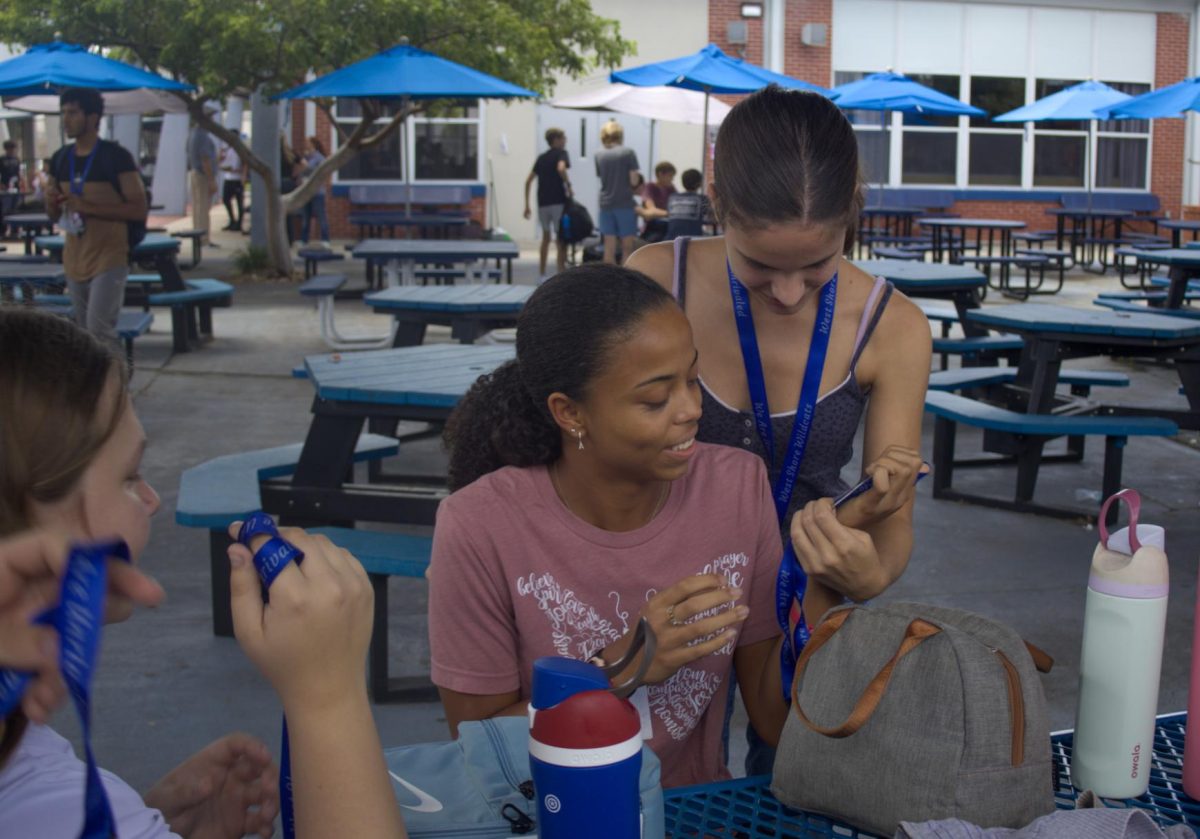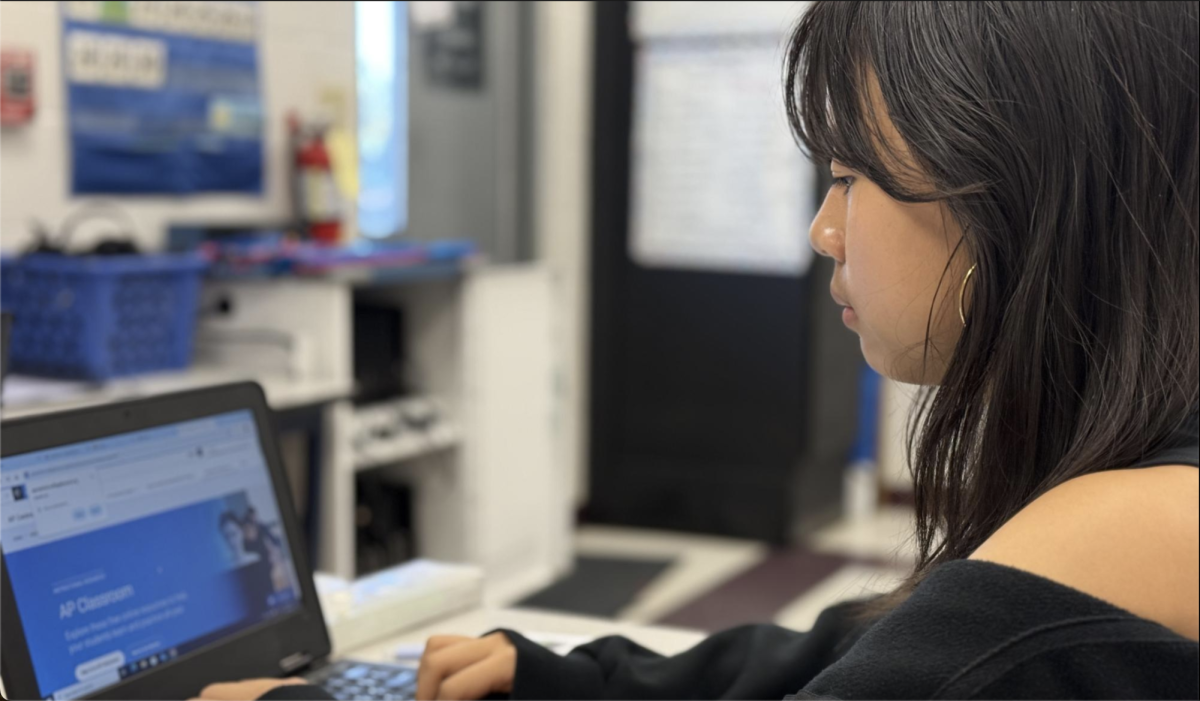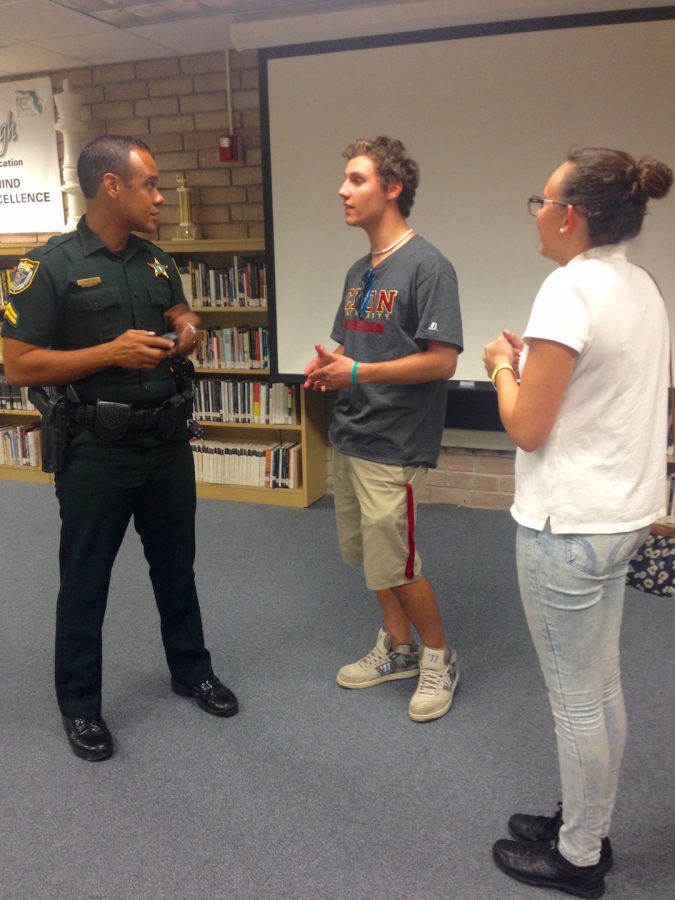College safety comes into focus for seniors
Officer gives college bound defence presentation at PTA meeting
Asking Corporal John Martinez questions after his college safety presentation in the media center, seniors Katy Johnson and Austin Altevogt discuss the proper defensive stance taught in the police academy.
April 21, 2016
Passing your college classes is not all you have to worry about when you go away to a university. With violent crimes happening every six minutes in the state of Florida and every 26.2 seconds in the United States, knowing how to defend yourself and make safe decisions should be a major concern for parents and students alike, according to Corporal John Martinez, from the Brevard County Sheriff’s Office.
“People, although we are very smart, don’t listen to our instincts very well,” Martinez said. “We’ll see someone who we see as a threat. And then we say to ourselves, ‘Nah, he’s probably a good guy.’ We justify away all those things. When we come to talk about self-defense,everyone already has what you need to defend yourself — your instincts. You’ve just got to tap into it.”
Martinez spoke on the topic of College Bound Safety to a group of about 30 parents and students who attended the West Shore PTA meeting April 19.
“Most of self-defense is all in your mind, just simply being aware of your situation and your surroundings,” Martinez said. “The idea is not to be an easy target.”
Walking while texting on your cell phone can mark you as a target of crime, he said. If you are unaware or daydreaming, then an attacker has an advantage because you are unprepared to react. Criminals like to pick on easy targets, he said.
“I learned how important your mindset is,” senior Julia Blackwell said. “I never really thought about using your mindset as a weapon before, thinking that you can win, staying positive and taking your fear and turn it into energy to fight of somebody else.”
According to American-school-search.com, many of Florida’s major universities — including the University of Florida, Florida State University, University of Central Florida, University of South Florida and Florida Institute of Technology — all got D-plus college safety rankings. Flagler College and the University of North Florida got a ranking of C minus. Ivy League schools Yale and Harvard were given the lowest score of F.
“The lesson to take away from the crime statistics is to research the area your school is in,” Martinez said. “It’s a good thing to know how often a particular crime happens in that specific place. If you don’t research that information before you go there, you may walk around with a false sense of safety or not knowing how dangerous the places you are going to school is.”
Presentation attendee and senior Katy Johnson plans on taking a sheriff-offered self-defense class before attending the Florida Gulf Coast in the fall.
“(The presentation) helped me get a sense of the things I need to look for when leaving next year,” Johnson said. “(As well as) things I need to stop doing to be safer like texting while walking to my car. And to take the elevator over stairs.”
Assistant Principal Lisa Kratz attended the event.
“I think Corporal Martinez had a good impact with the students in regards to seniors just having a better understanding of what to look out for when they get to college. You live right now at school in a tight-knit community area. When you go someplace else, you don’t always have those relationships. You don’t always know what you’re getting yourself into, so I thought he gave some good explanation of what to look out for in college.”
If you feel threatened, Martinez recommends taking a defensive physical stance that is taught at the Police Academy: Keep your hands above your waist, with evenly distributed weight in your legs. This allows for increased reaction time and mobility.
Other tips Martinez shared:
• If you carry pepper spray, make sure you know how to use it by practicing with it in your backyard first. Also, the spray becomes ineffective after about eight months, so remember to replace it periodically.
• Situations that are high risk include parking lots (hold your keys like a weapon), and gas stations when pumping gas (keep the passenger side door locked).
• Keep your car keys and charged cell phone next to your bed at night.
• Use the elevator instead of stairs when possible. But don’t get on the elevator if there’s someone on it who looks suspicious.
• When you enter a room, be aware of where the exit signs are.
The sheriff’s office offers self-defense classes. For more information, call (321) 454-6652.


![Sophomore Isabelle Gaudry walks through the metal detector, monitored by School Resource Officer Valerie Butler, on Aug. 13. “I think [the students have] been adjusting really well," Butler said. "We've had no issues, no snafus. Everything's been running smoothly, and we've been getting kids to class on time.”](https://westshoreroar.com/wp-content/uploads/2025/08/IMG_9979-1200x800.jpg)













































